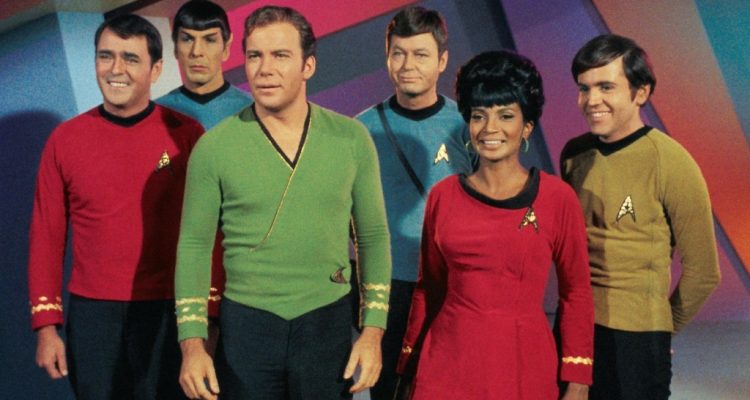You’re jolted awake 10 minutes before your alarm by a phone call and decide to use this unexpected time to microwave some leftovers for your first pre-10 a.m. breakfast in years. Then comes class. It’s 8 a.m. and losing even those 10 extra minutes of sleep has left you even groggier than normal. No fear — this is a language class and there’s a new app that not only records your professor, but also translates what they are saying into English and, in your relief, you shout— “thank ‘Star Trek’!”
Don’t actually do that. Your professor WILL NOT appreciate the reference.
Still, you, and many others, may wonder why you should thank, or even think about a show that concluded in the 60s. Especially since “Star Trek” received the 2018 Academy Emmy Governor’s Award on Saturday, September 8. Even more so since this award, as said on the Emmy website, “honors an individual or organizational achievement in the television arts and sciences that is exceptional and universal in nature and goes beyond the scope of annual Emmy awards recognition,” and has traditionally been awarded to shows or organizations that are, to put it simply, more recent. However, as a long term, dedicated member of the fanbase, my only surprise came from realizing that “Star Trek” had not already received this award.
To begin with, while explaining why every single college student should bow down and worship “Star Trek” creator Gene Roddenberry, every piece of technology mentioned in that opening scenario was sparked by “Star Trek.” Cell phones were “communicators,” iPads and tablets were “PADDs,” Microwaves “replicators” and those handy new translation apps work just like Trek’s “universal translator.” Still, it can hardly be believed that “Star Trek,” with it’s poor-to-put-it-nicely special effects, won this prestigious award due to its influence on technology. In fact, there is little to no chance that this was the case. Instead, most probably, “Star Trek” earned this award because it was well and truly revolutionary.
Disguised as a family-friendly show, “Star Trek” ran commentary on the social and political issues of its time, challenging societal norms and commenting on political issues in a way that would go over the heads of the NBC representatives who green-lighted episodes until fans reacted and those same representatives got a bit angry.
With “Star Trek” airing during the Cold War, the greatest enemy to the “good-guy” Federation were the Klingons, a United States Media representation of the members of the Soviet Union. Portrayed as indiscriminate killers attempting to use violence to force everyone to follow their way of life, the Klingons were always defeated by the intelligent and heroic Captain Kirk (William Shatner) due to their at times bumbling manner. Then came episode “Day of the Dove” where Captain Kirk and a Klingon leader put aside their differences to work together and defeat a third party alien threat before separating, each retaining their own cultures and without a fight, despite the expectation from both of their organizations. This episode both offered a solution to the real Cold War and showed a positive portrayal of the Russians, who had previously only been viewed as murderous evil-doers. Needless to say, this was not a popularly held opinion, especially during a time when some considered “Star Trek” to already be pushing boundaries by having Russian character Pavel Andreievich Chekov working hand in hand with Captain Kirk in what, I at least, view as a beacon of hope to viewers that the Cold War would end without everyone dying.
The 60s were also, understatedly, still not the best time for people lacking a caucasian appearance. “Star Trek” loved to subvert this by pointing out how ridiculous it was to treat someone differently because of their skin color while pushing or completely breaking boundaries. One of the most famed examples of this lies in character Nyota Uhura (Nichelle Nichols), a young African American woman who, to begin with, was a vital member of both the starship bridge crew and the cast, even if she really didn’t get enough attention or have enough lines. She was also part of the first aired “interracial” television kiss alongside William Shatner. Another anger-sparking example occurred in the episode “Let That Be Your Last Battlefield” where the Enterprise crew encounters two aliens, each representing a different faction from the same planet, arguing over the lack of civil rights one faction granted the other due to their appearance. The difference in the appearance of these half black, half white aliens were that they were mirror, rather than perfect, images of one another. So one had their black half on the left and one on the right. The Enterprise crew repeatedly pointed out how absolutely ridiculous this was.
Yes, “Star Trek” did a lot to influence the tech industry, but, more importantly, “Star Trek” is a television show that worked hard and took some big risks to try to make the world a better place for everyone regardless of appearance, ability or background. The show challenged norms, willingly and repeatedly faced serious consequences by going over the heads of its production company to make change and embraced diversity to an extent rarely heard of in 2018, much even remotely expected back in the 1960s. With all of this in mind and the unofficial 2017-18 media philanthropy being diversity, how could “Star Trek” not earn this award?


[…] A Rightful Honor: The Importance of ‘Star Trek”s Impact Fairfield Mirror […]
[…] A Rightful Honor: The Importance of ‘Star Trek”s Impact Fairfield Mirror […]